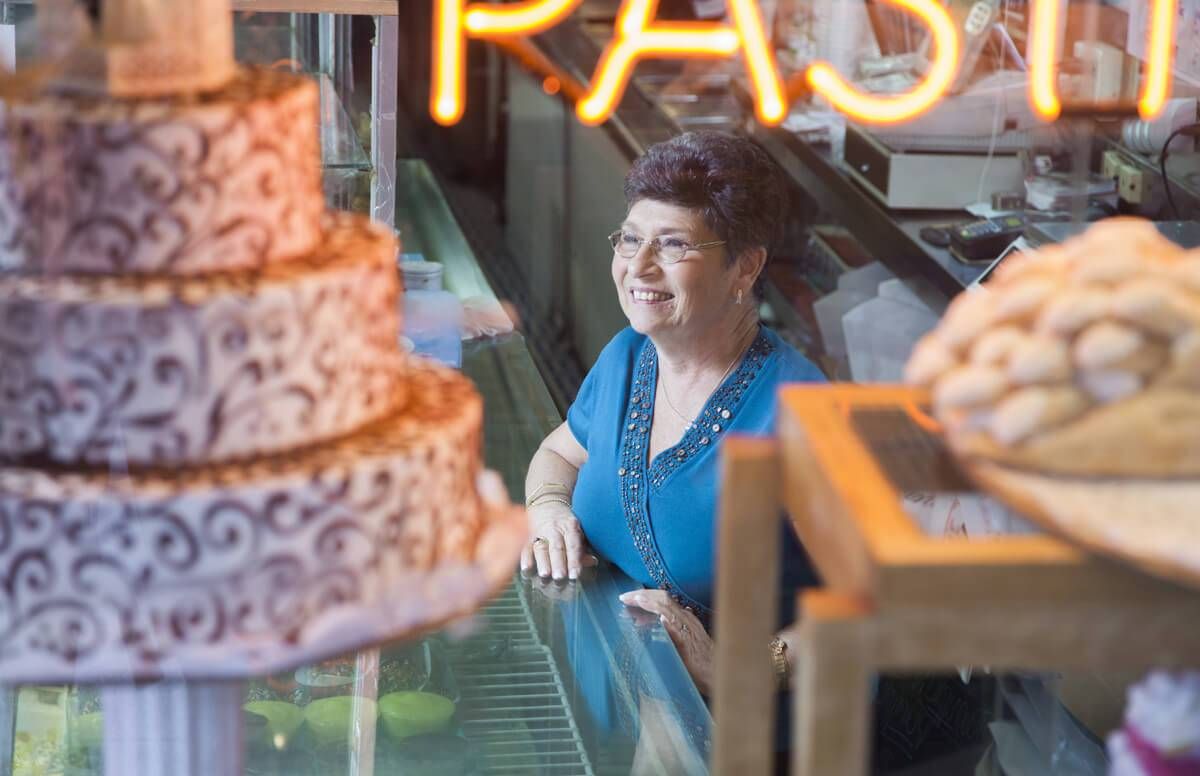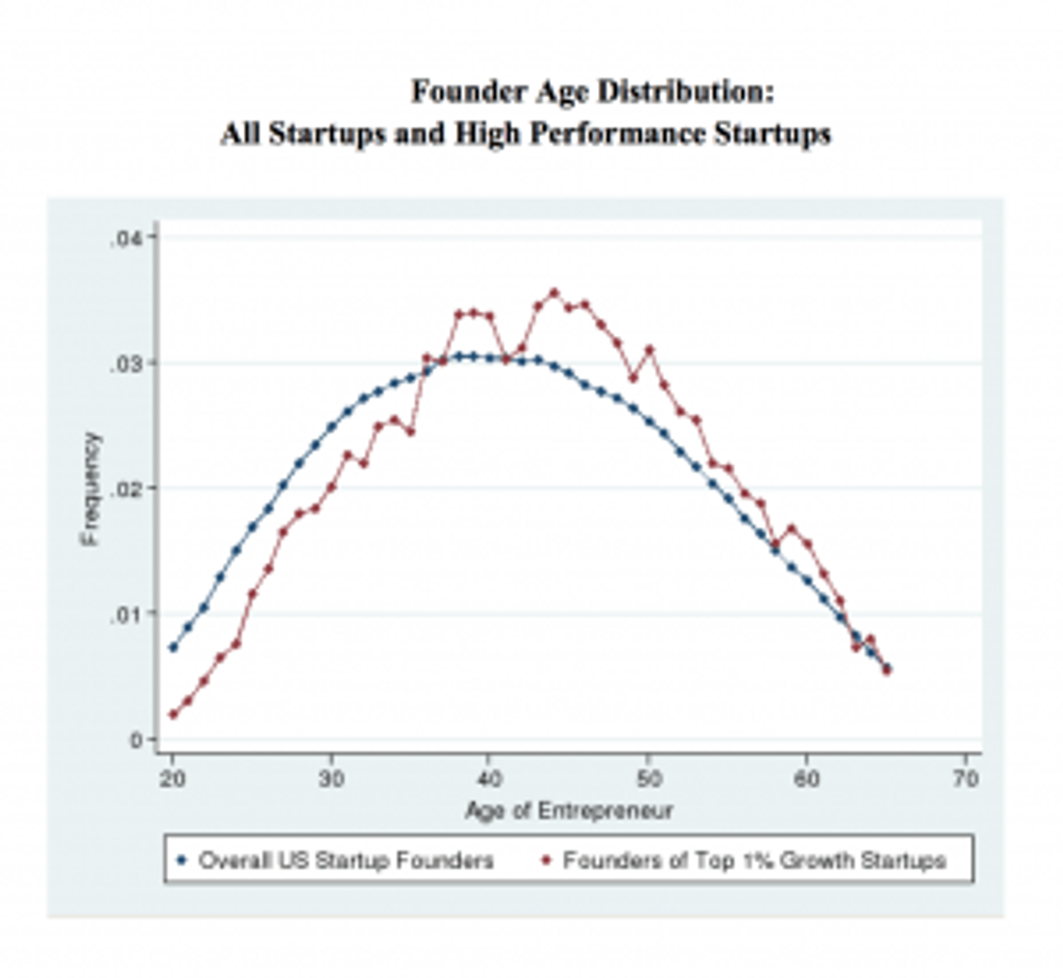Proof That the Most Successful Entrepreneurs Are Older Ones
Insights and advice for women over 50 who run businesses or hope to
Here’s refreshing news for boomers and Gen Xers, especially women considering starting businesses after 50 (who I’ve been writing about this year): When it comes to launching a successful business, youth is not the magic elixir.

“Successful entrepreneurs are middle-aged, not young,” according to Age and High-Growth Entrepreneurship, a paper by Pierre Azoulay and J. Daniel Kim of the Massachusetts Institute of Technology Sloan School of Management, Benjamin Jones of Northwestern University’s Kellogg School of Management and Javier Miranda of the Census Bureau’s Center for Administrative Records Research.
Most Successful Entrepreneurs: Middle Age and Beyond
“We find that age indeed predicts success, and sharply, but in the opposite way that many observers and investors propose, they wrote. “The highest success rates in entrepreneurship come from founders in middle age and beyond.”
The provocative paper published earlier this year may stun some people, but not me. It confirms what I’ve found studying and interviewing midlife entrepreneurs for more than a decade; I profiled successful launchers in my book What’s Next?
Refuting the Conventional Wisdom
The paper’s authors said: “Many observers, and many investors, believe that young people are especially likely to produce the most successful new firms. We use administrative data at the U.S. Census Bureau to study the ages of founders of growth-oriented start-ups in the past decade and find no evidence to suggest that founders in their 20s are especially likely to succeed. Rather, all evidence points to founders being especially successful when starting businesses in middle age or beyond, while young founders appear disadvantaged.”
While the authors parsed their research by age, geography and industry, I was disappointed they didn’t tease out data on gender; more on that shortly.
The study’s researchers calculated a mean age of 45 among the 1,700 founders of the fastest-growing new ventures. And they found the “batting average” for creating successful firms rises dramatically with age. “A 50-year-old founder is 1.8 times more likely to achieve upper-tail growth than a 30-year-old founder,” they wrote.

Older Entrepreneurs Vs. Younger Ones
As my colleague Richard Eisenberg noted in his Next Avenue column, research from The Kauffman Foundation, a nonpartisan group supporting entrepreneurship, backs the researchers analysis. In its 2018 State of Entrepreneurship survey of 2,165 business, older entrepreneurs reported having less difficulty starting their businesses than younger ones, in a variety of ways.
For example, while 32 percent of startup owners under 45 said obtaining the necessary licenses to operate their business was difficult, only 23 percent of older ones did. And 21 percent of those under 45 said applying for loans was difficult, but a mere 14 percent of those 45+ did.
The authors of Age and High-Growth Entrepreneurship theorize that there are few reasons an older entrepreneur may reap the benefits of start-up success over a younger one. These include: greater management, marketing and finance experience as well as a richer, deeper knowledge of an industry. Also — and this is important — they may have larger financial resources to tap and more social networks to mine for support in leveraging their idea.
The Importance of Work Experience for Successful Ventures
That said, they explained in a Harvard Business Review post about the study, “we found that work experience plays a critical role. Relative to founders with no relevant experience, those with at least three years of prior work experience in the same narrow industry as their startup were 85 percent more likely to launch a highly successful startup.”
Since I’m particularly interested in women entrepreneurs over 50, I contacted MIT professor Azoulay and asked if he could speculate on whether the results would be as true, or truer, for women midlife founders than for men. “We do not have any evidence on gender, so we cannot enlighten you, very sorry,” he replied.
What About Women Entrepreneurs?
Frankly, I’m surprised the gender discussion was left on the table. I regularly receive emails and calls from women interested in starting businesses and looking for guidance. Generally, they’re over 50. The number of businesses owned by women in the U.S. has more than doubled in 20 years, and women are starting an average of 849 new businesses per day. There are now 11.6 million women-owned businesses, employing nearly 9 million and generating more than $1.7 trillion in revenue.
So I’ll take a stab at the question myself. My unscientific prediction is that if gender had been part of the research findings, middle-age and older female entrepreneurs would have risen to the top of the charts in performance over time.
Here’s why: As I wrote in this recent post, after 50 can be a great time in life for women to launch companies. “Research shows that women’s confidence at work increases with age while at the same time, their family responsibilities — especially related to child bearing and rearing — decrease,” Kimberly A. Eddleston, a professor of entrepreneurship and innovation at Northeastern University and a senior editor on the EIX Editorial Board of the Schulze School of Entrepreneurship at the University of St. Thomas in Minneapolis, told me. “This makes entrepreneurship over 50 a great idea and a possibility.”
Midlife Women and Entrepreneurial Mojo
Another compelling reason midlife women have entrepreneurial mojo: “With their greater work experience and confidence, such women are more likely to see opportunities for a new business — customers whose needs are not being filled and gaps in product categories,” Eddleston said. “In turn, their work experience often gives them the networks to successfully launch a business at this career stage. They also often have the financial resources to support a new business.”
Sanyin Siang, author of The Launch Book: Motivational Stories to Launch Your Idea, Business or Next Career, told me that women have a few advantages over men as entrepreneurs. For one thing, they’re connectors. “We tend to have a diverse network,” she said. “That’s a diversity in terms of people with different backgrounds.”
Another advantage, according to Siang: Women tend to be open to “collaborative entrepreneurship.” That’s a terrific asset, but one that many would-be business owners dismiss.
“There is this idea that when we are starting something, we have to do it alone, to be the front and center person for it,” said Siang. In reality, she noted, “to succeed, you need to expand your thinking about what your gifts and talents are. It might not be you running that company. You might come up with the idea and partner up with someone who is much better than you at execution and implementation. That’s collaboration, and something that comes naturally for many women.”
David Deeds, the Schulze Professor of Entrepreneurship at the University of St. Thomas in Minneapolis, concurred. “Entrepreneurship is a team sport, and women are good at working with others. That gives them a little advantage.”
Serious Concerns for Women Entrepreneurs
We hear a lot about sexism against businesswomen and a lack of capital for women-owned enterprises. And both of these are serious concerns. Nevertheless, experts I’ve interviewed have consistently told me that decades of workplace experience can make a big difference in whether womens’ businesses thrive. “The added work experience and the associated boost to their self-confidence significantly assists in the development of their businesses,” says Eddleston.
And women in mid- to late-career generally have more capital of their own to invest in their businesses than younger ones. “The ability to invest more capital provides a substantial advantage to these businesses,” Eddleston says.
Struggles in Year One
That doesn’t mean it’s easy for women owners. In the first year of owning a business, female entrepreneurs appear to struggle more than men, according to The Kauffman Foundation. Only 52 percent of women with first-year startups said their ventures performed well last year, while 67 percent of men said theirs did. The difference, however, fades over time. Among businesses that are five years old or older, 77 percent of women and 77 percent of men said their company performed well last year.
So my advice to mid-life female entrepreneurs or wannabes: Stay the course.
As Maya Angelou said: "All great achievements require time."



